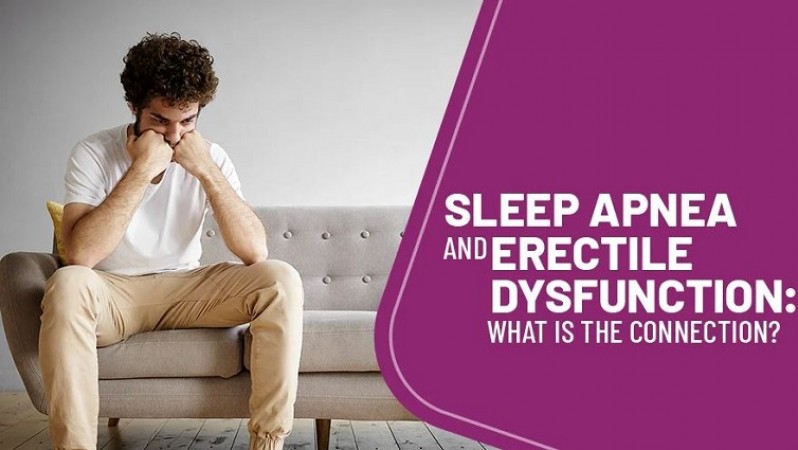
Sleep is an essential aspect of our lives, playing a vital role in maintaining overall health and well-being. However, for those who suffer from sleep disorders, a good night's sleep can often seem like an unattainable luxury. While the more recognized consequences of sleep disorders include anxiety, irritability, and metabolic issues like insulin resistance, recent research has revealed another concerning aspect. It appears that sleep disorders may also have a significant impact on men's sexual health, potentially leading to erectile dysfunction. In this article, we will delve into the findings of this study and explore how sleep disorders can affect men in ways beyond the expected.
Understanding Sleep Disorders
Before delving into the relationship between sleep disorders and erectile dysfunction, it's important to understand the various types of sleep disorders. Sleep disorders encompass a range of conditions that disrupt normal sleep patterns. Some common sleep disorders include:
Insomnia: Characterized by difficulty falling asleep or staying asleep, insomnia can lead to a lack of restorative sleep.
Sleep Apnea: Sleep apnea involves pauses in breathing during sleep, which can result in frequent awakenings and decreased oxygen levels.
Restless Leg Syndrome (RLS): RLS causes uncomfortable sensations in the legs, often leading to an irresistible urge to move them, interfering with sleep.
Narcolepsy: Narcolepsy is a neurological disorder that results in sudden and uncontrollable episodes of sleep during the day.
The Impact of Sleep Disorders on Men's Sexual Health
Now, let's explore how sleep disorders can harm men's sexual health and potentially lead to erectile dysfunction:
Hormonal Imbalance: Sleep is crucial for regulating hormone production in the body, including testosterone. Men with sleep disorders may experience a decrease in testosterone levels, which is essential for sexual function. Low testosterone levels can contribute to erectile dysfunction.
Endothelial Dysfunction: Sleep disorders have been linked to endothelial dysfunction, a condition that affects blood vessels' ability to relax and expand properly. This can lead to reduced blood flow, a critical factor in achieving and maintaining an erection.
Stress and Anxiety: Chronic sleep disturbances can lead to increased stress and anxiety levels, which can negatively impact sexual performance. Anxiety and worry about sleep problems can create a vicious cycle, exacerbating erectile dysfunction.
Poor Sleep Quality: Sleep disorders often result in poor sleep quality, characterized by frequent awakenings and disruptions throughout the night. This can lead to fatigue and a lack of energy, making sexual activity less appealing or feasible.
Relationship Strain: The effects of sleep disorders extend beyond the individual suffering from them. Partners of individuals with sleep disorders may also experience strain on their relationships due to disrupted sleep patterns and fatigue, which can indirectly affect sexual intimacy.
Addressing the Issue
Recognizing the connection between sleep disorders and erectile dysfunction is crucial for improving men's overall well-being. Here are some steps that can help address this issue:
Seek Professional Help: If you suspect you have a sleep disorder or are experiencing symptoms of erectile dysfunction, consult a healthcare professional. They can provide a proper diagnosis and recommend appropriate treatment options.
Treatment for Sleep Disorders: Depending on the specific sleep disorder, treatment options may include lifestyle changes, behavioral therapy, medications, or devices like continuous positive airway pressure (CPAP) machines for sleep apnea.
Stress Management: Practicing stress-reduction techniques such as mindfulness, meditation, or therapy can help manage the psychological effects of sleep disorders.
Healthy Lifestyle Choices: Adopting a healthy lifestyle, including regular exercise, a balanced diet, and avoiding excessive alcohol and tobacco use, can contribute to better sleep and improved sexual health.
Communication: Open and honest communication with your partner is essential. Discussing the impact of sleep disorders on your relationship and exploring ways to maintain intimacy can help both partners feel supported.
Sleep disorders are more than just an inconvenience—they can have far-reaching consequences, including potential harm to men's sexual health. Erectile dysfunction, a common condition affecting many men, has been linked to sleep disturbances. Recognizing the connection between sleep disorders and sexual health is the first step toward addressing this issue.
If you or a loved one is struggling with both sleep disorders and erectile dysfunction, seeking professional help is crucial. By addressing sleep problems, managing stress, and making positive lifestyle changes, it is possible to improve both sleep quality and sexual function, ultimately leading to a better overall quality of life. Sleep is indeed a necessity for health, and by taking steps to ensure better sleep, men can enhance their sexual health and well-being.